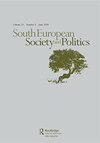Negative Perceptions of Jews in Turkish Politics: An Analysis of Parliamentary Debates, 1983-2016
IF 4.6
1区 社会学
Q1 POLITICAL SCIENCE
引用次数: 6
Abstract
ABSTRACT What are the political roots of anti-Jewish rhetoric? To address this ever-important query, this study analyses perceptions of Jews in Turkish politics. Building on group position theory and the historical background of Turkish-Jewish relations, the research proposes that right-wing ideological orientation and perceived threats can predict negative perceptions of Jews. It scrutinises the Turkish parliamentary proceedings using quantitative and qualitative content analysis. The findings support the premise. The study concludes that discussing perceived threats tends to evoke negative rhetoric while right-wing ideological orientation seems to be a predictive factor for the expression of such views. This implies that an effective management of perceived threats would reduce the frequency of anti-Jewish statements in Turkish politics.土耳其政治对犹太人的负面看法:1983-2016年议会辩论分析
反犹太言论的政治根源是什么?为了回答这个重要的问题,本研究分析了土耳其政治中对犹太人的看法。基于群体立场理论和土耳其-犹太人关系的历史背景,该研究提出右翼意识形态取向和感知到的威胁可以预测对犹太人的负面看法。它使用定量和定性内容分析来审查土耳其议会程序。研究结果支持了这一假设。该研究得出结论,讨论感知到的威胁往往会引发负面言论,而右翼意识形态取向似乎是表达这种观点的一个预测因素。这意味着对感知到的威胁的有效管理将减少土耳其政治中反犹言论的频率。
本文章由计算机程序翻译,如有差异,请以英文原文为准。
求助全文
约1分钟内获得全文
求助全文
来源期刊

South European Society and Politics
Multiple-
CiteScore
5.80
自引率
21.20%
发文量
14
期刊介绍:
A leading point of reference for scholars of Southern Europe, South European Society and Politics promotes both comparative and inter-disciplinary analyses, as well as offering innovative single county and sub-national studies. The journal acts as a forum for social, economic, cultural, contemporary historical and political approaches to research on the region, and is particularly keen to sponsor policy–focused studies in all these disciplines. The journal publishes research articles; South European Atlas with election reports and articles on other subjects of topical interest, and an extensive book reviews section, including both review articles and individual book reviews.
 求助内容:
求助内容: 应助结果提醒方式:
应助结果提醒方式:


